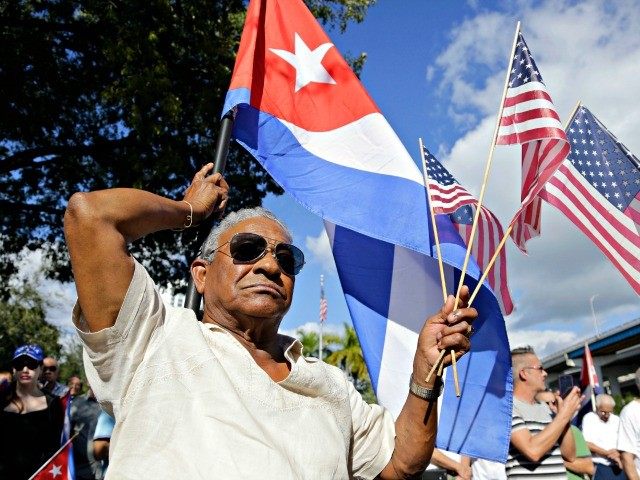President Obama’s State of the Union speech tonight, like so many of its predecessors, relied heavily on America’s moral duty to lead the world in values — for its applause lines.
The President vowed to “respect human dignity,” to “defend free speech, and advocate for political prisoners, and condemn the persecution of women, or religious minorities, or people who are lesbian, gay, bisexual, or transgender,” to robust audience support.
But he did so long after belying that very point, praising his own administration for its multiple capitulations to Cuba’s brutal Castro regime in December. The President masked the deals — which threaten to make the Castro regime exponentially wealthier without providing any benefit to the average Cuban national — as “extend[ing] the hand of friendship to the Cuban people.”
The State of the Union provided no new information on the Cuba deal; it barely provided new rhetoric. The President parrotted the platitude that has many agreeing with his new policy toward Cuba yet again: “When what you’re doing doesn’t work for fifty years, it’s time to try something new.”
He asserted that his new policy “has the potential to end a legacy of mistrust in our hemisphere; removes a phony excuse for restrictions in Cuba; stands up for democratic values.” He quoted his co-conspirator on brokering the Cuba deal, Pope Francis, in currying the goodwill of his audience.
In celebrating Alan Gross, an American who sacrificed much of his life to free the victims of Castro oppression, the President, of course, failed to mention the price he had paid to free him: the three Cuban spies implicated in multiple killings of American citizens.
An American relying on the State of the Union speech for a picture of what Cuban-Obama administration diplomacy looked like would be kept in the dark on the potential removal of Cuba from America’s state sponsor of terrorism list, despite harboring the leaders of the Revolutionary Armed Forces of Colombia (FARC), the second-wealthiest terrorist group in the world (after the Islamic State).
In celebrating the potential end of restrictions on the part of American governments on Cuban trade, the President failed to mention that restrictions imposed by the Cuban government on trade with Americans allowed to travel to Cuba are actually growing.
Omitting the details that unmask President Obama’s new policy on Cuba as wildly irresponsible is disingenuous to the average American who, struggling to make ends meet in the Obama economy, may simply not have the time to do the research on the nation’s new approach to the Castro regime.
Even more objectionable was the President’s claim that the policy “stands up for democratic values” and, later, the asserting that his administration strives to “advocate for political prisoners,” when so many of Cuba’s most prominent dissidents, and former political prisoners, oppose the shift.
To place a fine exclamation point on how much President Obama’s policies hurt the Cuban people, Republican leaders made sure that among those attending the speech would be two of the Cuban dissident community’s loudest opponents of the Obama Cuba plan. Attending the speech as a guest of Senator Marco Rubio, Rosa María Payá — the head of Cuba’s Christian Liberation Movement — condemned the White House’s new policies as “symbolic solidarity.”
The guest of House Speaker John Boehner, dissident leader Jorge Luis García Pérez, led a protest against the Obama policies when they were announced in December in Miami. Pérez has called the policies “treason,” stating at a press conference: “Obama has allied himself with the oppressors of our nation and the murderers of our people.”
Pérez, known popularly as Antúnez, would know better than most the heavy hand of the Castro dictatorship. He has surfaced as one of the most prominent leaders of the Cuban dissident movement after spending 17 years as a prisoner of conscience for speaking against the government in public in 1990, where he was subjected to torture on multiple occasions. He has conducted multiple hunger strikes, the longest lasting almost 70 days in 2009.
To people like Payá, whose father is widely believed to have been killed for calling publicly for elections in Cuba by the Castro government, and Pérez, there is little evidence that President Obama has any interest in policies that “advocate for political prisoners.”

COMMENTS
Please let us know if you're having issues with commenting.